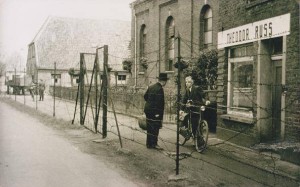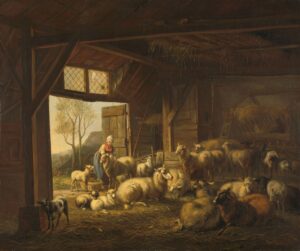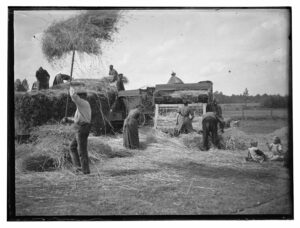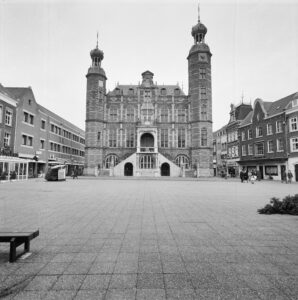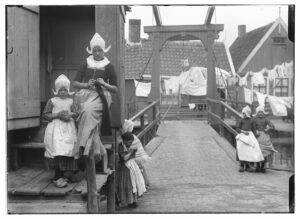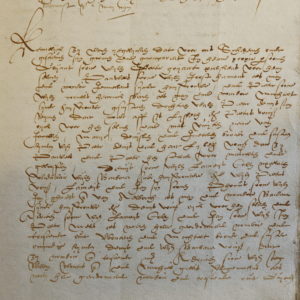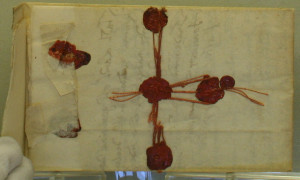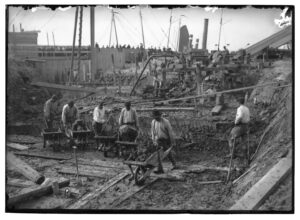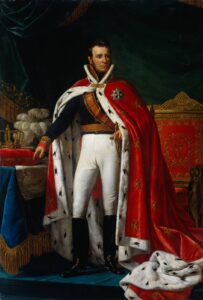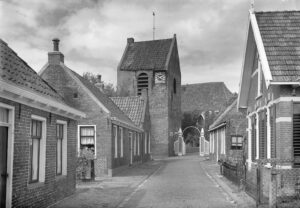A grens is a border. Municipal borders determined where a couple would register the birth of their child, where they were taxed, where they would apply for a permit. Judicial borders determined which court prosecuted a ciminal, granted a divorce, or appointed a guardian. Borders affected our ancestors' lives. My ancestor Arend Kastein moved across the street and tried to apply for a job as a policeman. But since that street happened to be the Dutch-German border, he needed to be … [Read more...]
Dutch term – Levende have
Levende have means livestock. You may come across the term as a heading in inventories of estates in notarial records or voluntary legal records. Just because someone owned livestock does not mean that they made their living by farming. Many people owned a goat or cow for their milk. They may have sold the surplus, but would have other means of income. … [Read more...]
Dutch term – Dorsen
Dorsen means to thresh. The person doing the threshing is the dorser. You will not often find that as an occupation as it was just one of many jobs farms or their laborers did. … [Read more...]
Dutch term – Stadhuis
The stadhuis (literally: city house) is the town hall. Town hall is where people would register births and deaths for the civil registration, and where civil marriages would take place. It was often the place where the aldermen's court convened, and where the town clerks kept their registers. … [Read more...]
Dutch term – Kind, kinderen
A kind is a child, plural kinderen. You may come across the term in wills, guardian appointments or other types of notarial and court records. … [Read more...]
Dutch term – Boedelscheiding
A boedelscheiding is an estate division. This often happened after someone died. An estate division record will include details about the estate and will list who got what. These records can typically be found in notarial records, or in voluntary court records before 1811 in regions where there were no notaries. If there was not much to divide, the estate may have been divided informally without there being an official record. … [Read more...]
Dutch term – Beschikbaar, beschikbaarheid
Beschikbaar means available; beschikbaarheid means availability. You may come across the terms in finding aids and texts discussing how to consult records. For example, a finding aid may include a section about availability to discuss where the records are kept, how they can be accessed, whether they are available online, or whether there are access restrictions to consider. … [Read more...]
Dutch term – Grondwerker
A grondwerker (literally: ground worker) was a digger. Diggers could be employed by builders, to dig foundation trenches, or by canal builders. It was hard, low-paying work. … [Read more...]
Dutch term – Koninkrijk
Koninkrijk means kingdom. The Netherlands was the Dutch Republic until 1795, when the French occupied the country. It became the Kingdom of Holland in 1806, with Louis Napoleon as its first king. It was part of the French empire from 1810 to 1813. After the defeat of the French, it became the Kingdom of the Netherlands in 1813. The House of Orange has supplied the monarchs ever since. Kings of Holland Louis Napoleon (1806-1810) Kings and Queens of the Netherlands Willem I … [Read more...]
Dutch Term – Nederlands Hervormd
Nederlands Hervormd means Dutch Reformed, a protestant religion. You may come across the term in population registers or church records. The Dutch Reformed church adopted that name in 1816. Before that, it was known as Nederduits Gereformeerd [Nederdutch Reformed]. There are many other protestant religions that split off from the main Dutch Reformed church, including Gereformeerd [Christian Reformed]. … [Read more...]
